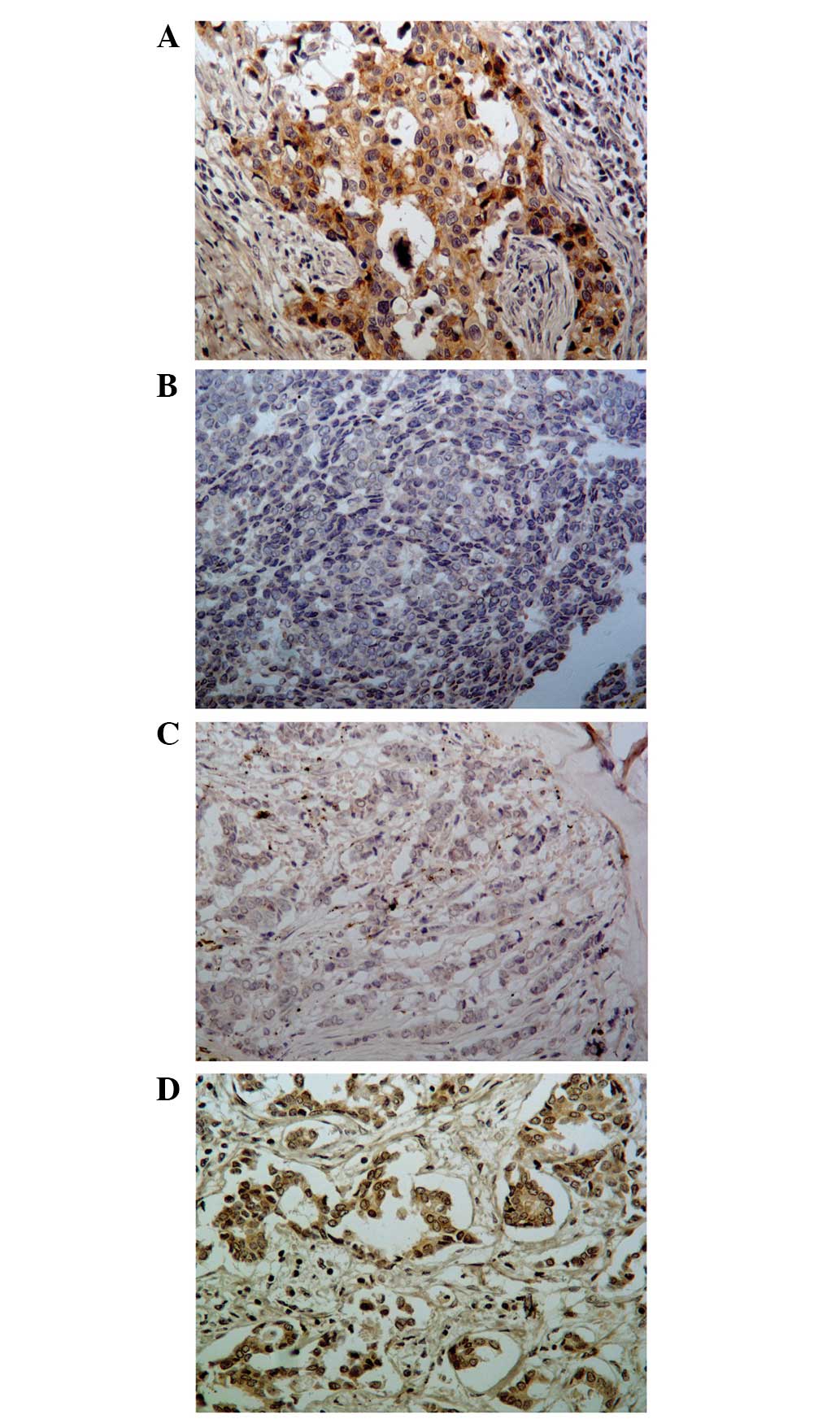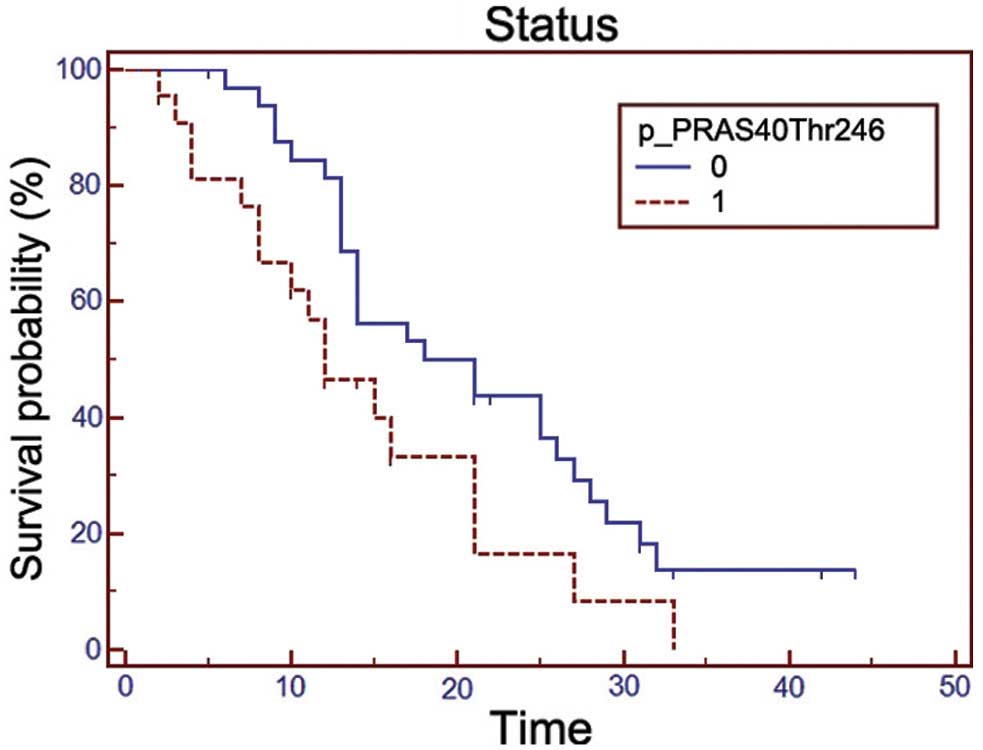|
1
|
Slamon DJ, Clark GM, Wong SG, et al: Human
breast cancer: correlation of relapse and survival with
amplification of the HER-2/neu oncogene. Science. 235:177–182.
1987. View Article : Google Scholar : PubMed/NCBI
|
|
2
|
Slamon DJ, Godolphin W, Jones LA, et al:
Studies of the HER-2/neu proto-oncogene in human breast and ovarian
cancer. Science. 244:707–712. 1989. View Article : Google Scholar : PubMed/NCBI
|
|
3
|
Huang Y, Fu P and Fan W: Novel targeted
therapies to overcome trastuzumab resistance in HER2-overexpressing
metastatic breast cancer. Current Drug Targets. 14:889–898. 2013.
View Article : Google Scholar : PubMed/NCBI
|
|
4
|
Vogel CL, Cobleigh MA, Tripathy D, et al:
Efficacy and safety of trastuzumab as a single agent in first-line
treatment of HER2-overexpressing metastatic breast cancer. J Clin
Oncol. 20:719–726. 2002. View Article : Google Scholar : PubMed/NCBI
|
|
5
|
Berns K, Horlings HM, Hennessy BT, et al:
A functional genetic approach identifies the PI3K pathway as a
major determinant of trastuzumab resistance in breast cancer.
Cancer Cell. 12:395–402. 2007. View Article : Google Scholar : PubMed/NCBI
|
|
6
|
Razis E, Bobos M, Kotoula V, et al:
Evaluation of the association of PIK3CA mutations and PTEN loss
with efficacy of trastuzumab therapy in metastatic breast cancer.
Breast Cancer Res Treat. 128:447–456. 2011. View Article : Google Scholar : PubMed/NCBI
|
|
7
|
Andersen JN, Sathyanarayanan S, Di Bacco
A, et al: Pathway-based identification of biomarkers for targeted
therapeutics: personalized oncology with PI3K pathway inhibitors.
Science Transl Med. 2:43ra552010. View Article : Google Scholar
|
|
8
|
Esteva FJ, Guo H, Zhang S, et al: PTEN,
PIK3CA, p-AKT, and p-p70S6K status: association with trastuzumab
response and survival in patients with HER2-positive metastatic
breast cancer. Am J Pathol. 177:1647–1656. 2010. View Article : Google Scholar : PubMed/NCBI
|
|
9
|
Nagata Y, Lan KH, Zhou X, et al: PTEN
activation contributes to tumor inhibition by trastuzumab, and loss
of PTEN predicts trastuzumab resistance in patients. Cancer Cell.
6:117–127. 2004. View Article : Google Scholar : PubMed/NCBI
|
|
10
|
Zhang L, Shi L, Zhao X, Wang Y and Yue W:
PIK3CA gene mutation associated with poor prognosis of lung
adenocarcinoma. Onco Targets Ther. 6:497–502. 2013.PubMed/NCBI
|
|
11
|
Lu YZ, Deng AM, Li LH, et al: Prognostic
role of phospho-PRAS40 (Thr246) expression in gastric cancer. Arch
Med Sci. 10:149–153. 2014. View Article : Google Scholar : PubMed/NCBI
|
|
12
|
Fu R: Clinicopathological and prognostic
significance of phosphorylated PRAS40 (Thr246) in breast cancer.
Asian Biomedicine (Research Reviews and News). 6:573–577. 2012.
|
|
13
|
Saal LH, Holm K, Maurer M, et al: PIK3CA
mutations correlate with hormone receptors, node metastasis, and
ERBB2, and are mutually exclusive with PTEN loss in human breast
carcinoma. Cancer Res. 65:2554–2559. 2005. View Article : Google Scholar : PubMed/NCBI
|
|
14
|
Eichhorn PJ, Gili M, Scaltriti M, et al:
Phosphatidylinositol 3-kinase hyperactivation results in lapatinib
resistance that is reversed by the mTOR/phosphatidylinositol
3-kinase inhibitor NVP-BEZ235. Cancer Res. 68:9221–9230. 2008.
View Article : Google Scholar : PubMed/NCBI
|
|
15
|
Wang Q, Ding H, Liu B, et al: Addition of
the Akt inhibitor triciribine overcomes antibody resistance in
cells from ErbB2/Neu-positive/PTEN-deficient mammary tumors. Int J
Oncol. 44:1277–1283. 2014.PubMed/NCBI
|
|
16
|
Fountzilas G, Christodoulou C, Bobos M, et
al: Topoisomerase II alpha gene amplification is a favorable
prognostic factor in patients with HER2-positive metastatic breast
cancer treated with trastuzumab. J Transl Med. 10:2122012.
View Article : Google Scholar : PubMed/NCBI
|
|
17
|
Minuti G, Cappuzzo F, Duchnowska R, et al:
Increased MET and HGF gene copy numbers are associated with
trastuzumab failure in HER2-positive metastatic breast cancer. Br J
Cancer. 107:793–799. 2012. View Article : Google Scholar : PubMed/NCBI
|
|
18
|
Wang H, Zhang Q, Wen Q, et al:
Proline-rich Akt substrate of 40kDa (PRAS40): a novel downstream
target of PI3k/Akt signaling pathway. Cell Signal. 24:17–24. 2012.
View Article : Google Scholar
|
|
19
|
Junttila TT, Akita RW, Parsons K, et al:
Ligand-independent HER2/HER3/PI3K complex is disrupted by
trastuzumab and is effectively inhibited by the PI3K inhibitor
GDC-0941. Cancer Cell. 15:429–440. 2009. View Article : Google Scholar : PubMed/NCBI
|
















